 Tìm kiếm
Tìm kiếm
Thông tư 148/2018/TT-BQP quy định tuyển chọn và gọi công dân nhập ngũ
| Số hiệu: | 148/2018/TT-BQP | Loại văn bản: | Thông tư |
| Nơi ban hành: | Bộ Quốc phòng | Người ký: | Phan Văn Giang |
| Ngày ban hành: | 04/10/2018 | Ngày hiệu lực: | 20/11/2018 |
| Ngày công báo: | 24/10/2018 | Số công báo: | Từ số 1005 đến số 1006 |
| Lĩnh vực: | Bộ máy hành chính, Quyền dân sự | Tình trạng: | Còn hiệu lực |
TÓM TẮT VĂN BẢN
Đã có Thông tư 148/2018/TT-BQP về tuyển chọn và gọi nhập ngũ
Vừa qua, Bộ Quốc phòng đã ban hành Thông tư 148/2018/TT-BQP quy định tuyển chọn và gọi công dân nhập ngũ.
Theo đó, so với Thông tư 140/2015/TT-BQP thì đã có những quy định cụ thể hơn như:
- Tiêu chuẩn sức khỏe khi tuyển chọn công dân nhập ngũ được thực hiện theo quy định tại Thông tư liên tịch 16/2016/TTLT-BYT-BQP ngày 30/6/2016:
+ Tuyển chọn những công dân có sức khỏe loại 1, 2, 3;
+ Không gọi nhập ngũ vào Quân đội những công dân có sức khỏe loại 3 tật khúc xạ về mắt (cận thị 1,5 diop trở lên, viễn thị các mức độ); nghiện ma túy, nhiễm HIV, AIDS;
+ Đối với các cơ quan, đơn vị và vị trí trọng yếu cơ mật trong Quân đội, thực hiện tuyển chọn bảo đảm tiêu chuẩn riêng theo quy định của Bộ Quốc phòng.
- Tiêu chuẩn tuyển quân về tuổi đời:
Công dân nam được đào tạo trình độ cao đẳng, đại học đã được tạm hoãn gọi nhập ngũ trong thời gian một khóa đào tạo của một trình độ đào tạo thì tuyển chọn và gọi nhập ngũ đến hết 27 tuổi.
Thông tư 148/2018/TT-BQP có hiệu lực thi hành từ ngày 20/11/2018, thay thế Thông tư 140/2015/TT-BQP ngày 16/12/2015.
Văn bản tiếng việt
Văn bản tiếng anh
|
Ministry of National Defense |
SOCIALIST REPUBLIC OF VIETNAM |
|
No. 148/2018/TT-BQP |
Hanoi, 04th of October, 2018 |
CIRCULAR
Provisions for selecting and conscripting citizens
Pursuant to the Law on Military Service dated June 19. 2015;
Pursuant to Decree No. 164/2017/ND-CP dated December 30, 2017 of the Government on functions, tasks, powers, and organizational structure of the Ministry of National Defense;
At the request of the Chief of the General Staff;
The Minister of National Defense promulgates the Circular on provisions for selecting and conscripting citizens.
Article 1. Scope of regulation and regulated entities
1. This Circular specifies the provisions for selecting and conscripting citizens; responsibilities of agencies, organizations and individuals in selecting and conscripting citizens (hereinafter referred to as "drafting").
2. This Circular applies to the People’s Committees at all levels, agencies, units, organizations and individuals related in the preparation and implementation of drafting.
Article 2. Drafting principles and requirements
1. Follow the guidelines and principles of the Communist Party, policies and law of the State and procedures, regulations on drafting.
2. Ensure drafting adequacy and quality, recruit following top-down selection procedure; assure democracy, equality, openness, security and cost efficiency.
3. Emphasize the responsibilities of every organization and individual to improve the effectiveness of the drafting.
4. Focus on drafting graduates, ethnics to improve the quality of the regular armed force and reserve force, which form the constructive fundamentals to enforce the local political facilities, to strengthen national defense and security, and to protect the Socialist of Vietnam Fatherland.
Article 3. Drafting quota and time
1. Comply with the Decision of the Prime Minister on conscripting citizens annually.
2. Pursuant to the Decision of the Prime Minister, the Minister of National Defense decides to introduce the quota for conscripting citizens to entities affiliated to the Ministry of National Defense in every province, central-affiliated cities (hereinafter referred to as “provincial").
Article 4. Drafting requirements
1. Age:
a) Citizens from the age of 18 to under 26.
b) Graduate male citizen who enters university or college and postpones conscription for a training course of a level will be drafted until he turns 28.
2. Political requirements:
a) Comply with Joint Circular No. 50/2016/TTLT-BQP-BCA dated April 15, 2016 of the Minister of National Defense – the Minister of Public Security on provisions for political requirements for conscripting citizens into the Vietnamese People’s Army.
b) Drafting for crucial and classified agencies, units and positions in the Army; ceremonial battalion; professional National Guards and Military shall comply with regulations and law of the Ministry of National Defense.
3. Health requirements:
a) Draft citizens with health type 1, 2, 3 as specified in Joint Circular No. 16/2016/TTLT-BYT-BQP dated June 30, 2016 of the Minister of Health – the Minister of National Defense on provisions for pre-enlistment check-up.
b) Drafting for agencies, units and positions specified in Point b Clause 2 of this Article must ensure separate standards as regulated by the Ministry of National Defense.
c) Do not conscript citizens with health type 3 and eye disorders (1.5 dioptre myopia or higher, hypermetropia at all degrees); drug addicts, those contracted with HIV, AIDS.
4. Cultural requirements:
a) Draft citizens who finished 8th grade or higher in descending order. In areas where the drafting quota cannot be guaranteed due to hardship, request the competent authorities to consider and decide to draft citizens who finished 7th grade.
b) Communes in remote and isolated areas, in areas with economic - social hardships according to regulations and law; ethnic minorities below 10,000 people shall draft no more than 25% of the citizens who finished primary education and the citizens who finished lower secondary education are drafted to fill the rest.
Article 5. Drafting postponement and exemption
The drafting postponement and exemption during peace time shall comply with Article 41 of the 2015 Law on Military Service. To be specific:
1. The following citizens shall have their conscription postponed:
a) Citizen whose health is unsatisfactory for active military service according to the conclusion of pre-enlistment check-up board.
b) Citizen being the only breadwinner who directly takes care of his relatives who lost working capacity or under working age; citizen being the only breadwinner in a family suffering serious damage to humans and property due to dangerous accidents, disasters, epidemics confirmed by the People’s Committees of the communes, wards, towns (hereinafter referred to as “communes”).
c) Citizen who is a child of sick soldiers, people infected with dioxin and suffering labor capacity reduction from 61% to 80%.
d) Citizen whose biological siblings is a non-commissioned officer/active duty enlisted soldier or a non-commissioned officer/enlisted soldier performing service in the police.
dd) Citizen who subject to emigration or evacuation in the first 03 years to extremely disadvantaged communes according to the socio-economic development project of the State decided by the People's Committees of provinces or higher levels.
e) Citizen who is an official or a youth volunteer assigned to an extremely disadvantage socio-economic area according the law provisions.
g) Citizen who is studying at a compulsory education institution or receiving training or university level at a higher education institution or training of college level at a vocational education institution for a training course of a level.
2. The following citizens shall have their conscription exempted:
a) Citizen who is a child of revolutionary martyrs or grade 1 wounded soldiers.
b) Citizen who is a brother of revolutionary martyrs.
c) Citizen who is a child of grade 2 wounded soldiers; a child of sick soldiers suffering labor capacity reduction of 81% or above; a child of people infected with dioxin and suffering labor capacity reduction of 81% or above.
d) Citizen who is carrying out cipher activities and not a soldier or police.
dd) Citizen who is an official or a youth volunteer assigned to an extremely disadvantaged socio-economic area according the law provisions for 24 months or more.
3. The citizens eligible for postponement specified in Clause 1 of this Article shall be drafted if the reason for postponement is no longer available.
The citizens eligible for postponement or exemption from conscription specified in Clause 1 and Clause 2 of this Article if volunteer to join the army shall be considered for selection and conscription.
4. The lists of citizens eligible for postponement and exemption from conscription shall be posted publicly at the head offices of the People’s Committees of communes and/or relevant organizations or agencies for 20 days from the day in which the Chairmen of the People’s Committees of ward-level sign the Decision.
Article 6. Responsibilities of local authorities
1. The responsibilities of the People’s Committees at all levels:
a) Successfully publicizing, popularizing and educating to improve the awareness and responsibilities to comply with the Law on Military Service of the people, particularly those within the mentioned age group; directing the drafting to follow the procedures, fulfill the quota, meet the standards.
b) Establishing the Board of military service with adequate quantity and composition as regulated; assigning tasks and explaining the implementation responsibilities to organizations and individuals. Utilizing the roles and responsibilities of local political structures; the consulting roles of military agencies at all levels and the responsibilities of the heads of the communes, hamlets, neighborhoods, residential areas, villages (hereinafter referred to as “communes”) that contribute to the drafting.
c) Allocating the quota suitable for the conditions of the locality and provincial areas; guaranteeing drafted citizens in every commune, ward and town.
d) Ensuring the drafting procedure is fulfilled, the personnel is selected carefully; enabling the accepting units to inspect the dossiers, confirm the size and enabling units authorized by the Ministry of National Defense to get to know the recruit’s detailed information (health, family, background and political standards). Collaborating with the accepting agencies in swapping, filling enlisted citizens who fail to meet the standards, quality (if any); the swapping, filling ratio must not exceed 2% of the local quota; being responsible for the quality of the recruits.
dd) Directing the Board of military service and relevant boards, departments to monitor, instruct, expedite and inspecting the implementation of drafting; annually, take charge of organizing conferences in cooperation on drafting and experience-learning meetings, concluding the drafting operation according to regulations and law.
e) Promptly handling complaints and denunciation, stringently taking actions against violations in drafting as per law; publicizing to raise awareness, uniting the people’s viewpoint, preventing negativity.
2. The responsibilities of the People’s Committees of provinces:
Carrying out the responsibilities specified in Clause 1 of this Article and instructing the Board of military service, relevant departments, boards and People’s Committees of wards, districts, towns, cities affiliated to the province (hereinafter referred to as “province”) to draft as per law and ensure adequate recruits.
3. The responsibilities of the People’s Committees of wards:
a) Carrying out the responsibilities specified in Clause 1 of this Article and instructing the Board of military service, relevant departments, boards and People’s Committees of wards to draft as per law and ensure adequacy and quality of the recruits.
b) Directly implementing and guiding the drafting; acknowledging of the number of citizens currently staying and absent from the locality; training the officials and employees participating in drafting; directing the enlisting, check-up, careful inspection, ensuring democracy, equality, openness and transparency; enabling the citizens to enlist promptly, cleanly as regulated; assigning each member of the Board of military service to be responsible for monitoring and guiding certain communes, agencies, organizations and will be jointly responsible for the adequacy and quality of the recruits.
c) Establishing the Pre-enlistment Check-up Board and pre-enlistment check-up groups consisting of personnel of various majors and fully equipped as per law; setting up check-up locations, specifying responsibilities of organizations and individuals participating in pre-enlistment check-up to ensure quality, accurate conclusion and responsibilities the results.
d) Organizing the implementation of certifying the drafting postponement and drafting exemption with carefulness, democracy, equality, openness. The organized implementation must be approved by the Chairmen of the People’s Committees of communes.
dd) Directing the call for pre-enlistment check-up suitable for each locality; the total number of citizens called for check-up must not exceed the quadrupled quota. Confirming the size of personnel, dispatching the district conscription orders, the backup must not exceed 5% of the total quota of the districts and fulfilling all the procedures and files (including the Members of the Communist Party dossier, Ho Chi Minh Communist Youth Union dossier) of the drafted citizens transferred to the accepting agencies.
e) Directing the Board of military service, while performing check-up, to register the amount of military equipment for each citizen and inform the accepting agencies to guarantee the provisions as regulated; providing certain military equipments for new recruits from 03 to 05 days prior to the Soldier accepting ceremony to ensure consistency and appropriateness in each division, military branch and local weather, climate condition.
g) Regularly exchanging information relating conscripted citizens; collaborating with the accepting agencies to swap or fill personnel in their units (if any) to meet the quality and deadline as regulated.
4. The responsibilities of the People’s Committees of communes:
a) Carrying out the responsibilities specified in Clause 1 of this Article and instructing the Board of military service, relevant departments, boards and hamlets to draft as per law and ensure adequate recruits.
b) Directing the hamlets to elect and nominate male citizens within the aforementioned age group to participate in the military service pre-qualifications according to regulations and law; ensuring democracy, equality, openness, quality and efficiency.
c) Directly implementing the pre-qualification and examining drafted citizens; reporting to People’s Committees of districts to compile the lists of citizens eligible for conscription, postponement and exemption from military service. Filing dossiers relating military service and procedures applied to citizens eligible for conscription, the files will then be transferred to the Military Commands of districts.
Publicly posting at the office of the People’s Committees of communes as regulated and publicly informing each hamlet the following details:
- The quota assigned to the commune by the corresponding district:
- The drafting conditions and standards; cases of military service postponement and exemption;
- The lists of citizens within the conscription range;
- The lists of postponed or exempted citizens;
- The lists of citizens eligible for conscription;
- Health classifying results of the Pre-enlistment check-up Board;
- The lists of citizens accepted and ready for military service.
d) Directing the Military Commands of communes to collaborate with relevant boards and departments to instruct the conscripted citizens, fill in the health insurance application form which will be approved by the People’s Committee of communes then transferred to the Military Commands of districts with the military dossiers.
dd) Directing the Military Commands of communes to collaborate with the police authorities of communes and other boards, departments and entities to get to know the political, moral standards and other recent difficulties of the conscripted citizens, promptly inform and provide the information for the Military Commands of districts and the accepting agencies for acknowledgement and management. Collaborating with the accepting agencies and families on taking actions against service desertion according to regulations and law.
Article 7. Responsibilities of the accepting agencies
1. Cooperating with the conscripting locality to agree with the locality on the quota, dossier examination duration and size of personnel 10 days before the date in which the military agencies of districts dispatch the conscription orders; collaborating with the locality organizing and attending the Soldier accepting ceremony; accepting and transporting the personnel to their unit by military tracks or trains, ships to ensure maximum security; stationing personnel at the locality for extended period of time is prohibited; exceptionally preparing all aspects to accept and train new recruits as planned.
2. Units assigned to get to know the recruits’ detailed information must actively cooperate with the locality to carry out the implementation as specified by the Ministry of National Defense.
3. Within 07 days from the day of receiving the recruits, the accepting agencies must check the standards of new recruits again and finish swapping, filling (if any).
If the accepting agencies are anticipating the verification relating politics, moral or medical assessment, they must promptly inform and cooperate with the districts to swap, fill the personnel. The swapping, filling period must not exceed 15 days from the day of receiving the recruits; the swapping, filling rate must not exceed 2% of the local quota.
4. Being responsible for the additional examinations, agree with the military agencies of districts to record and perform any swapping, filling (if any) at the unit. Annually, implementing experience-learning meetings, conclusions on drafting according to regulations and law.
5. Within 15 days from the day of receiving the recruits, the unit must lists the new recruits and their close relatives eligible for joining health insurance and report as per law.
Article 8. Military regions’ responsibilities
1. Directing, guiding, examining units in charge of drafting as specified in Article 7 of this Circular.
2. Directing, guiding, examining the local civil agencies of provinces consulting the People’s Committees of the same level about directing the Board of military service to draft as regulated, ensuring personnel adequacy.
3. Annually, directing and guiding the localities, units and directing implementing experience-learning meetings, conclusions on drafting according to regulations and law.
Article 9. Responsibilities of agencies and units affiliated to the Ministry of National Defense
Based on their functions and tasks, directing, guiding and inspecting the drafting; regularly keeping the situation under control, cooperating with the localities securely, enabling the localities and units to draft as per law.
Article 10. Cooperation in drafting
1. The People’s Committees of provinces, of districts must take charge in the overseeing of the cooperation between the localities and the accepting agencies to agree on the criteria and various time benchmarks for examining dossiers, getting to know the recruits’ detailed information, concluding the personnel size, transferring and accepting methods. To be specific:
a) The People’s Committees of provinces must cooperate with divisions, brigade and similar ranking units (direct subordinates to entities affiliated to the Ministry).
b) The People’s Committees of districts must cooperate with regiments and similar ranking units (direct subordinates to divisions and similar ranking units).
2. The People’s Committees of provinces, of districts must direct the military agencies and police authorities at the same level to collaborate cautiously in drafting citizens and fulfilling the duty of joining the police; military agencies and police authorities agree on the quota and personnel for conscription and fulfilling the duty of joining the police.
3. The localities and the military units must collaborate and cooperate cautiously in recruiting and managing soldiers. The accepting agencies must send their commanding officers as per law to cooperate with the People’s Committees of provinces, of districts on drafting and be responsible for the terms of the cooperation.
Article 11. Organizing Soldier accepting ceremony
1. The High Commands of the military regions must collaborate with the People’s Committees of provinces within military regions’ territories; reach a consensus on organizing of the soldier accepting ceremony of the Military and Police forces in the same day.
2. The People’s Committees of provinces must hold the Soldier accepting ceremony according to regulations, ensure formality, orderliness, safety, cost efficiency and create exciting atmosphere; the record of accepting recruits between the localities and the accepting units will be signed at the end of the ceremony.
1. This Circular comes into force from November 20, 2018 and supersedes Circular No. 140/2015/TT-BQP dated December 16, 2015 of the Ministry of National Defense on provisions for selecting and conscripting citizens.
2. If the legislative documents extracted in this Circular are approved for amendments or superseded by other legislative document, the new documents will apply.
Article 13. Responsibility for implementation
The Chief of the General Staff, Chairmen of the People’s Committees of provinces and central-affiliated cities and heads of relevant agencies, units are responsible for the implementation of this Circular./.
|
|
PP. MINISTER |
Văn bản liên quan
Cập nhật
Bài viết liên quan
Bị bệnh gout có phải đi nghĩa vụ quân sự 2025 không?

Bị bệnh gout có phải đi nghĩa vụ quân sự 2025 không?
Sức khỏe luôn là yếu tố quan trọng quyết định khả năng tham gia nghĩa vụ quân sự. Một trong những căn bệnh có thể ảnh hưởng đến khả năng phục vụ trong quân ngũ là bệnh gout. Vậy, người mắc bệnh gout có phải thực hiện nghĩa vụ quân sự trong năm 2025 hay không? 25/11/2024Bị bệnh xương khớp có phải đi nghĩa vụ quân sự 2025 không?
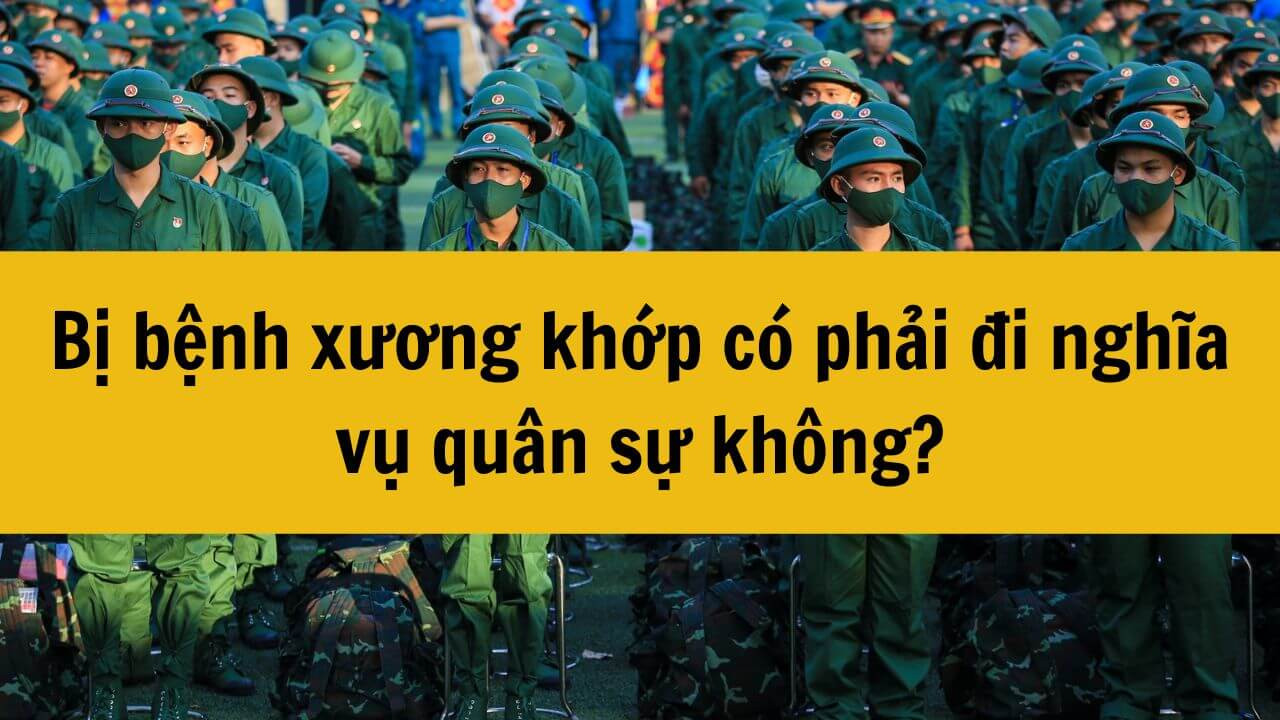
Bị bệnh xương khớp có phải đi nghĩa vụ quân sự 2025 không?
Bệnh xương khớp là một trong những vấn đề sức khỏe ngày càng trở nên phổ biến, ảnh hưởng lớn đến khả năng vận động và sinh hoạt hàng ngày của nhiều người. Trong bối cảnh nghĩa vụ quân sự được xem là trách nhiệm thiêng liêng của công dân, câu hỏi liệu những người mắc bệnh xương khớp có phải tham gia nghĩa vụ quân sự vào năm 2025 hay không đang thu hút sự quan tâm của xã hội. Hãy cùng tìm hiểu rõ hơn về vấn đề này và những quy định hiện hành liên quan đến sức khỏe khi thực hiện nghĩa vụ quân sự. 25/11/2024Năm 2025 bị trĩ có phải đi nghĩa vụ quân sự không? Bị trĩ xếp vào sức khỏe loại mấy?
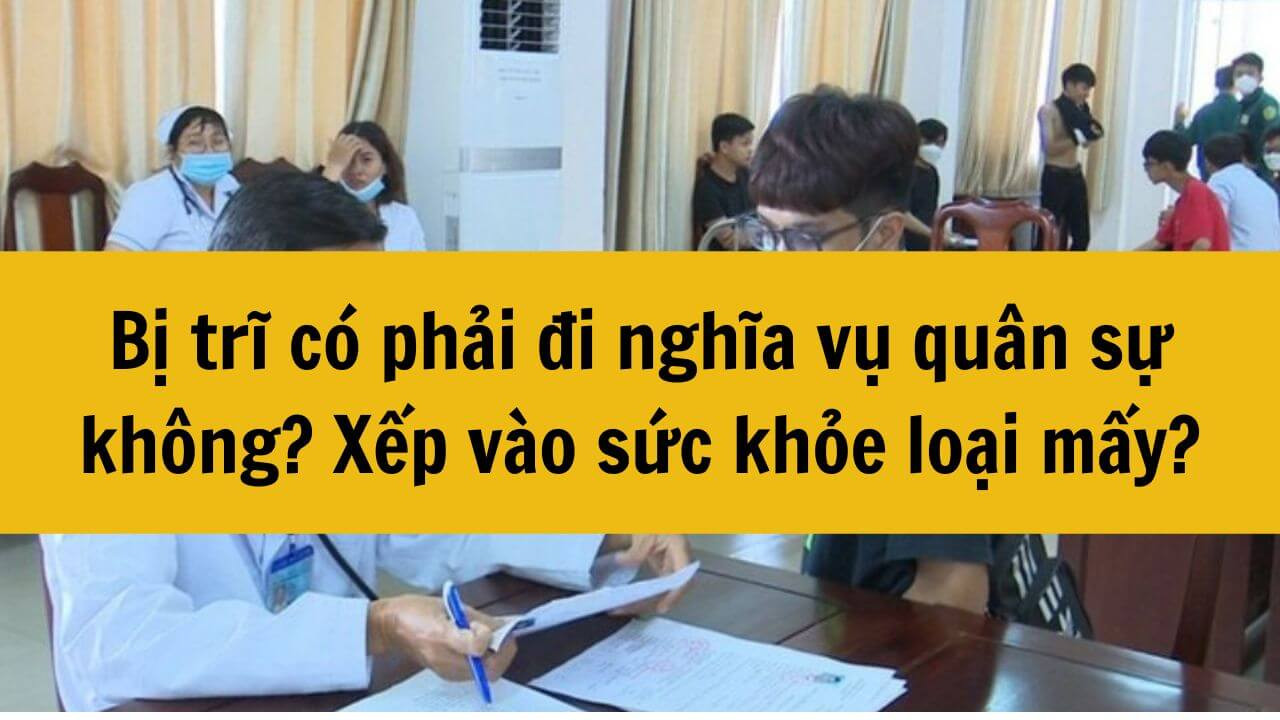
Năm 2025 bị trĩ có phải đi nghĩa vụ quân sự không? Bị trĩ xếp vào sức khỏe loại mấy?
Bị trĩ là một trong những vấn đề sức khỏe mà nhiều người gặp phải, và nó không chỉ ảnh hưởng đến đời sống hàng ngày mà còn có thể gây khó khăn trong việc thực hiện nghĩa vụ quân sự. Với sự quan tâm ngày càng cao về sức khỏe cộng đồng và quyền lợi của công dân, câu hỏi liệu người mắc bệnh trĩ có phải tham gia nghĩa vụ quân sự hay không đang trở thành chủ đề nóng bỏng trong xã hội hiện nay. Vậy hiện nay pháp luật quy định thế nào về vấn đề này? 25/11/2024test toc-heading
Quy trình khám mắt đi nghĩa vụ quân sự mới nhất năm 2025
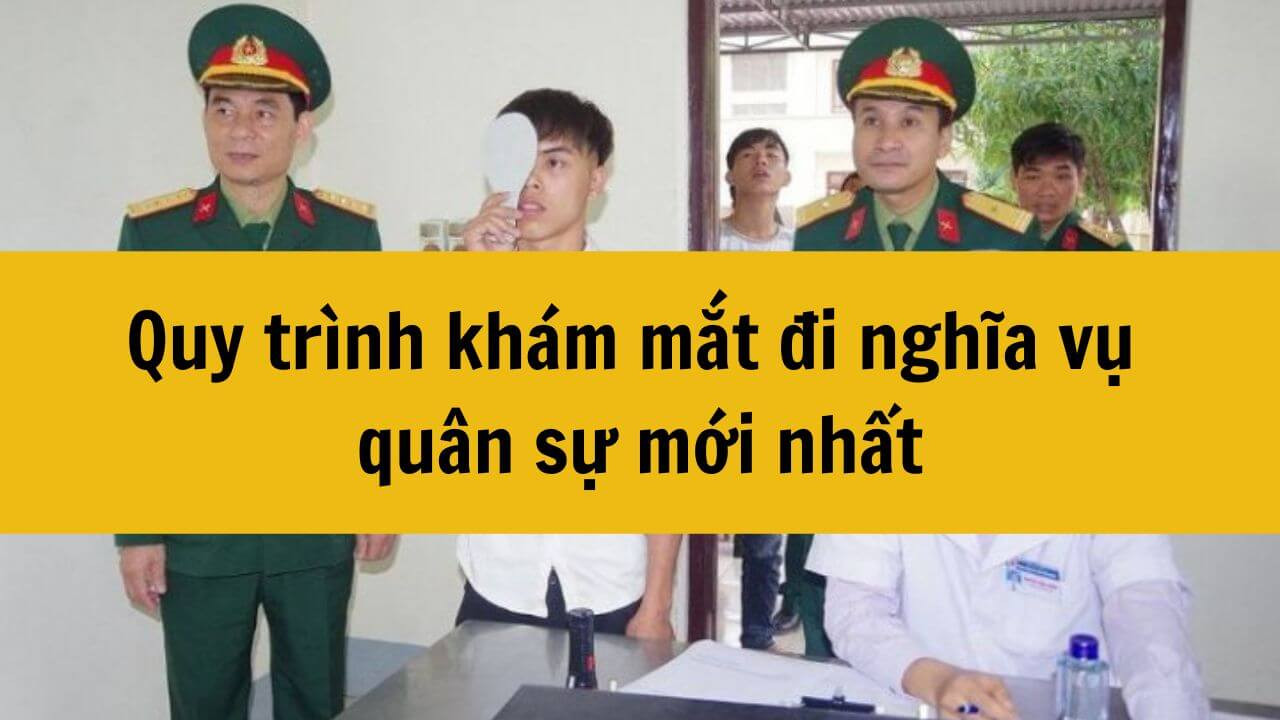
Quy trình khám mắt đi nghĩa vụ quân sự mới nhất năm 2025
Khi chuẩn bị cho nghĩa vụ quân sự, một trong những yếu tố quan trọng không thể bỏ qua là quy trình khám sức khỏe, đặc biệt là khám mắt. Đối với những thanh niên sắp bước vào nghĩa vụ, việc hiểu rõ quy trình khám mắt sẽ giúp họ chuẩn bị tốt hơn cho những yêu cầu về sức khỏe. Trong bài viết này, chúng ta sẽ cùng tìm hiểu chi tiết về các bước trong quy trình khám mắt đi nghĩa vụ quân sự năm 2025 và các tiêu chuẩn liên quan đến các bệnh về mắt trong khám nghĩa vụ quân sự. 24/11/202422 bệnh được miễn nghĩa vụ quân sự mới nhất 2025
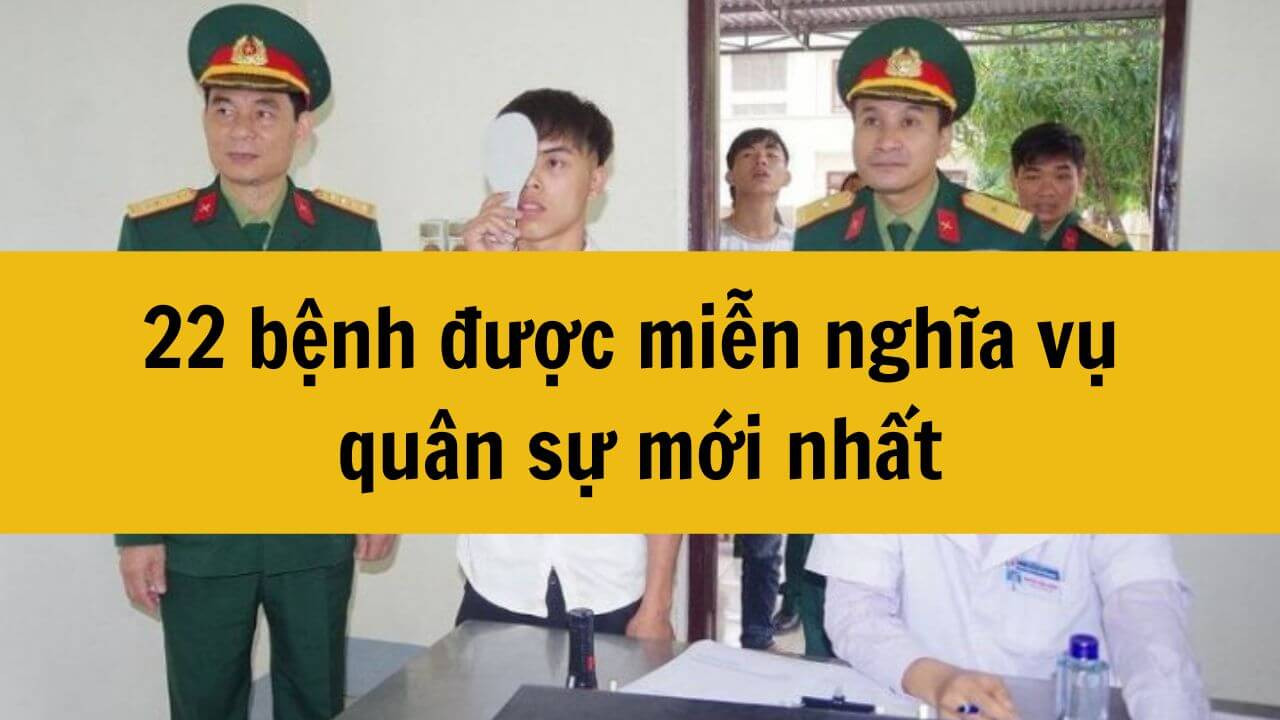
22 bệnh được miễn nghĩa vụ quân sự mới nhất 2025
Nghĩa vụ quân sự là trách nhiệm của mỗi công dân, nhưng không phải ai cũng có thể tham gia do những lý do sức khỏe. Pháp luật nước ta đã ban hành danh mục các bệnh lý cụ thể được miễn nghĩa vụ quân sự. Vậy danh mục 22 bệnh được miễn nghĩa vụ quân sự bao gồm những bệnh nào, hiện nay có sự thay đổi gì không? Điều kiện sức khỏe thế nào để công dân được miễn nghĩa vụ quân sự? 19/12/202406 trường hợp công dân không phải đi nghĩa vụ quân sự mới nhất 2025
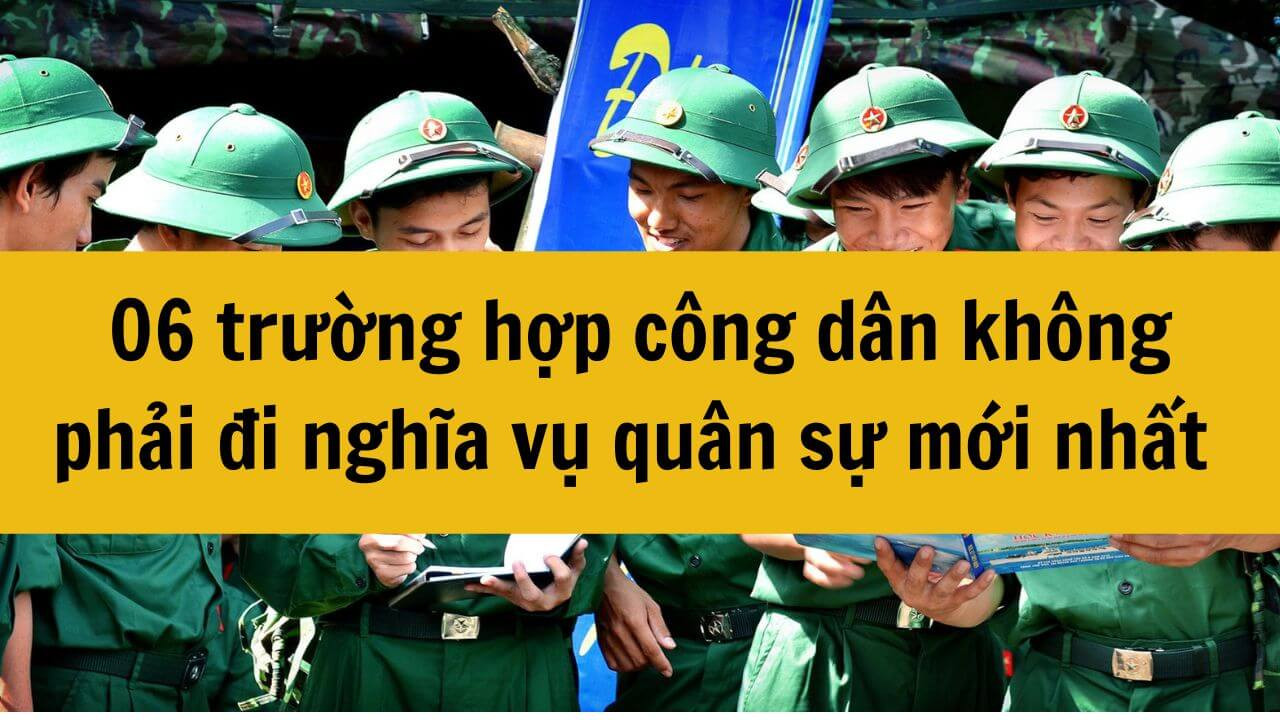
06 trường hợp công dân không phải đi nghĩa vụ quân sự mới nhất 2025
Nghĩa vụ quân sự là trách nhiệm thiêng liêng của mỗi công dân đối với Tổ quốc, nhưng không phải ai cũng đủ điều kiện để tham gia. Hiện nay, pháp luật đã quy định một số trường hợp mà công dân không thể đi nghĩa vụ quân sự. Vậy trong năm 2025, điều kiện để công dân không đi nghĩa vụ quân sự là gì? 24/11/2024Tiêu chuẩn đi nghĩa vụ quân sự mới nhất 2025
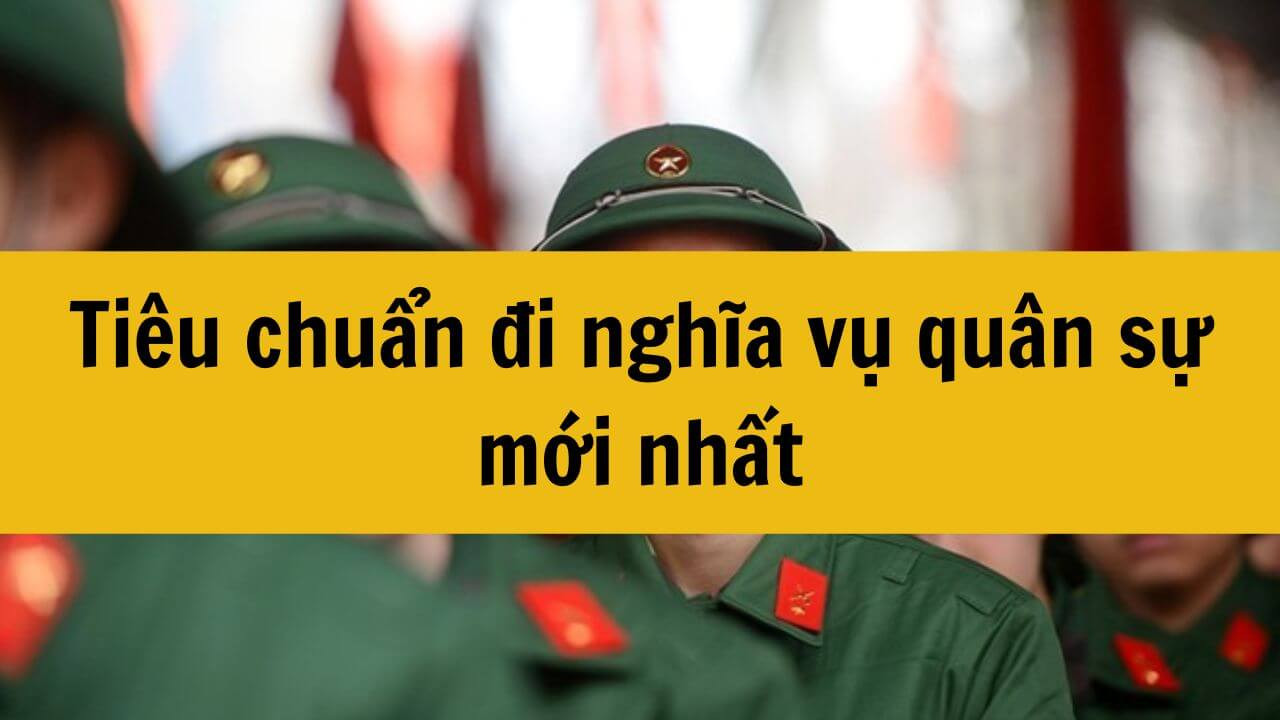
Tiêu chuẩn đi nghĩa vụ quân sự mới nhất 2025
Trong bối cảnh an ninh quốc gia ngày càng trở nên phức tạp và khó lường, nghĩa vụ quân sự đã và đang giữ vai trò quan trọng trong việc bảo vệ Tổ quốc. Năm 2025, những tiêu chuẩn đi nghĩa vụ quân sự không chỉ phản ánh yêu cầu của thời đại mà còn thể hiện sự quan tâm của Nhà nước đối với sức khỏe, trình độ học vấn và khả năng của thanh niên. Vậy tiêu chuẩn đi nghĩa vụ quân sự mới nhất 2025 được quy định ra sao? 24/11/2024Cận bao nhiêu độ được miễn nghĩa vụ quân sự năm 2025?

Cận bao nhiêu độ được miễn nghĩa vụ quân sự năm 2025?
Năm 2025 sắp đến gần. Với nhiều bạn trẻ, câu hỏi về nghĩa vụ quân sự trở nên cấp thiết hơn bao giờ hết. Liệu mỗi người có đủ sức khỏe để hoàn thành nghĩa vụ hay sẽ được miễn do các vấn đề sức khỏe? Đặc biệt, cận thị – một trong những tình trạng phổ biến hiện nay – có ảnh hưởng như thế nào đến nghĩa vụ quân sự trong năm 2025? 25/11/2024Mới nhất 2025: Bao nhiêu tuổi hết nghĩa vụ quân sự?
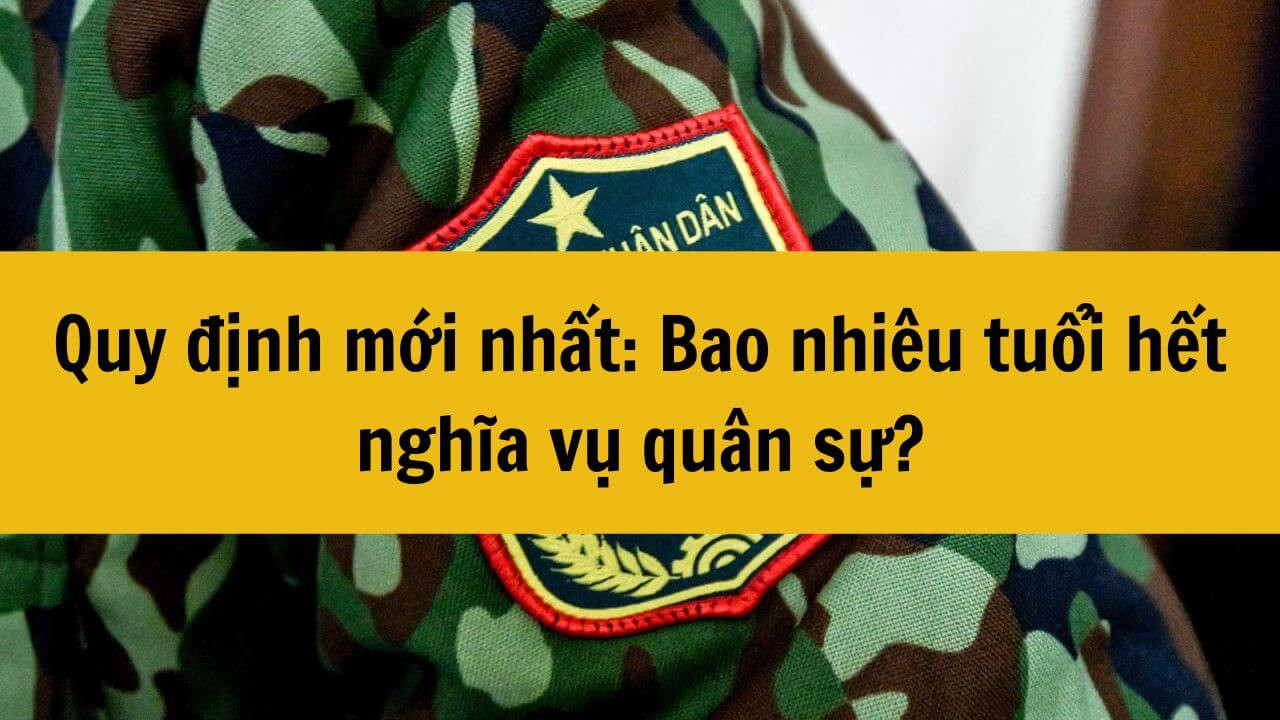

 Thông tư 148/2018/TT-BQP quy định tuyển chọn và gọi công dân nhập ngũ (Bản Word)
Thông tư 148/2018/TT-BQP quy định tuyển chọn và gọi công dân nhập ngũ (Bản Word)
 Thông tư 148/2018/TT-BQP quy định tuyển chọn và gọi công dân nhập ngũ (Bản Pdf)
Thông tư 148/2018/TT-BQP quy định tuyển chọn và gọi công dân nhập ngũ (Bản Pdf)